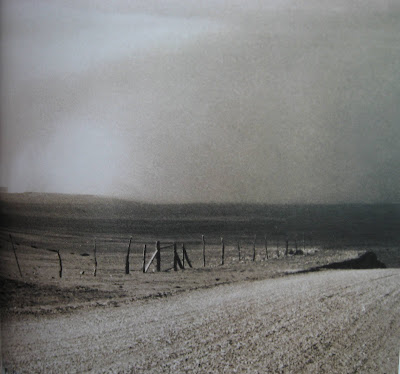
Hip-deep in some recent books relating to the Great Depression--the first one, I mean, not our on-going "Grim Regression"--I am offering here for the moment my own slight tribute to the astonishing, hauntingly beautiful, era-defining b&w photos taken by those artists working for the W.P.A. in the early Thirties: Ben Shahn, Walker Evans, Marion Post Wolcott, Arthur Rothstein and, of course, Dorothea Lange.
So: an encore presentation of my Lange dramatic monologue/ballad poem... but this time I'm adding photos that should enhance it a lot:
 Ballad for Dorothea
Ballad for DorotheaI saw the plow that broke the Plains
break on dust and “drouth.”
That’s what the people called it,
a word as dry in the mouth
as a farmer’s thirst. Or his curse.
That damnable dearth of rain
dried up the land, growing
crops of nothing--but a harvest of shame

when bankers foreclosed on families
who’d seeded the earth with their bones,
raising up an army of the homeless
I held in the lens
of my eye long enough
to let the pure
light within them burn this country
a way to a truer future.

I couldn’t think of them as migrants,
or Okies, like some, because I’d
seen the dusters come rolling and boiling,
blotting out the sky,
till a one’s hair and tongue and dreams
were all the same dark smudge.
To me they were refugees,
even the ones that held on and didn’t budge.

Those black blizzards ate the sun,
and I traveled through the towns,
the tent camps and Hoovervilles,
seeking with my lens
to tell the folks’ hard stories
without leaching their pride.
That was my strength: I could look
and not seem to be looking; I could

see the split-seconds that would
document lives—that bitter old man
with his cup, turned away
from the breadline; one
lone worker, his wheelbarrow dumped over,
head down and back against the wall… Yet
truth to tell, I suppose
I never quite caught

those broken farms on film.
How I envied Rothstein his glorious
shot of the man and his sons
leaning into the dust
storm! I was better focused
close on people: mothers and children
in tarpaper shacks, towns
fly-specked with aimless men,

whole families packing the roads.
Displaced persons everywhere I looked,
their faces streaked
with the dust they couldn’t lose. The Joads
were just folks I’d met;
I as much as snapped the photos
for John’s novel. Still, I don’t know
what they thought.

Times we’d talk, they weren’t what
you’d call articulate. Uneducated,
most of them, and shy.
But with hearts that could reach the sky
above the Great Plains. I
never knew a one of them to grovel,
or even ask for pity.
I loved them all

the only way I could—
I hugged them with the camera.
But I don’t see as how
my caring made any difference.
So many years now,
and the moneyed are still in control,
the homeless still search for cover.
I’ve come to believe we’re all,

poor and rich, wandering in ignorance;
refugees, on a road the dust blows over.

No comments:
Post a Comment